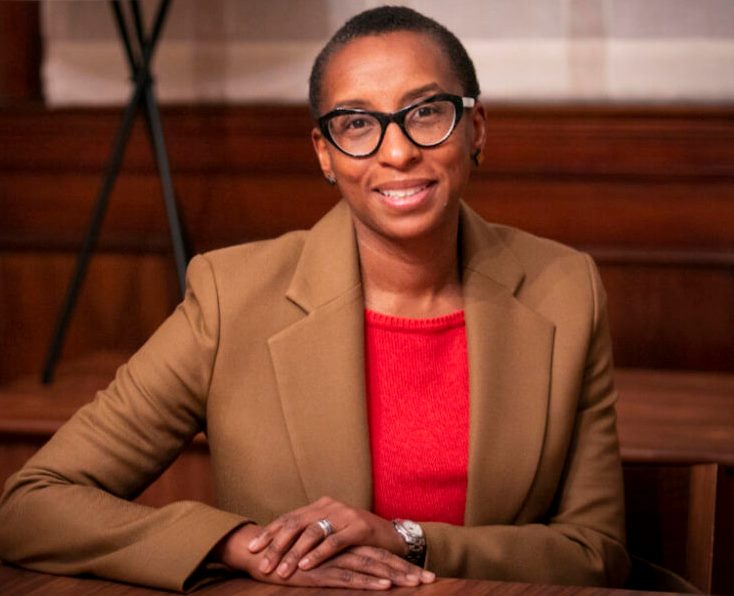Harvard University in the United States has named a new president but in a manner that will reverberate around the world. This is the first time it is happening for the leadership of Harvard that Prof Claudine Gay who will be serving as the 30th president Professor Claudine Gay is not only a woman, which matters for gender balancing, she is also a black from Haiti.

Immediate past VC of Oxford University, Prof Louise Richardson
More than her color and her gender, it means that some of the universities regarded as the most prestigious in the world are now run by women. On March 8th, 2022 when Intervention replayed a Times Higher Education listing of universities run by women, Women Stage a Silent Revolution in Global Academia, Seize 43 of the 200 Top Universities on the list to which Harvard is now added were Oxford, Cornell University, Imperial College London, University of Manchester, University of Pennsylvania, University of California at Berkeley, University of St Andrews, McGill University, University of Michigan – Ann Arbor, University of Wisconsin @ Madison, London School of Economics and the University of Minnesota.
Others on that list are Trinity College Dublin, University of Stockholm, Brown, University of Leiden, University of Queensland (where so much is taking place in Quantum Theory in relation to the social world), University of Southern California, University of Durham, University of Cape Town and the University of Monash.
Given the material resources and the power through articulation that these universities control, whoever sits atop any of these universities is powerful, no matter the degree of depersonalization of power and the demystification of hierarchy. The ‘take-over’ of some of the most powerful universities by women might not end the disparity between men and women especially in the parts of the world where class, race and gender oppression is still a problem but it speaks to the future! The symbolism of Prof Claudine Gay’s new position points at a repeat of the Obama becoming because of the symbolism of Harvard University in global academia and beyond, (its theories, models, students are everywhere, from politics to business to the cultural realm).
Below is a re-run of the March 8th, 2022 story by Intervention:
Women Stage a Silent Revolution in Global Academia, Seize 43 of the 200 Top Universities
Times Higher Education which compiled the figures of the number and the names of the 43 out of the top 200 global universities led by women Vice-Chancellors insists that it “is striking that still only a few of the world’s top universities are led by women”. But, what aggregation of power can be more than collective women headship of the incubation centres which produces most of pace setters in literature, military, philosophy, nuclear physics, communication engineering, Mathematics, Drama, Anthropology, History, Economics, Microbiology, International Relations and what have you?

Prof. Mamokgethi Phakeng, VC the University of Cape Town

LSE’ Prof Minouche Shafik
Hence, the notion of women take-over of the world suggested by the headline for this story, a hint that, with this figures, women have gone farther or the gender revolution has been more successful than the Socialist revolution, something that needs more investigation. The power of women as may be measured by the much of their presence in academia shows that the battle has been won and all that remains is consolidation. This is not to suggest that silent screams that are peculiarly patriarchy structured are not being heard from many parts of the world. Rather, it is to suggest how much progress has been made and how such progress tells us that the silent gender screams still emanating from here and there will also become a thing of the past too.
This contention or the headline may not apply much to sub-Saharan Africa but even then only in numerical terms. Otherwise, the Vice-Chancellor of Africa’s only member of the top 200 universities in the world is a woman. She is Professor Mamokgethi Phakeng, the Vice-Chancellor of the University of Cape Town in South Africa. In other words, Africa is part of the world where the silent revolution by women, either through careful plotting or aggressive campaign, have successfully taken over power.

Prof Suzanne Fortier of McGill University in Canada

Prof Carol Christ of the University of California at Berkeley, USA
So, how else might we put it when women are the Vice-Chancellors of 43 out of the 200 toughest universities in the world, almost all of the ones they head being some of the toughest and the most prestigious?
As it is until just a month or two ago, such centres include Oxford University in the UK where Prof Louise Richardson has been in charge for nearly seven years. And to think that she arrived at Oxford from another ‘Oxford’ – University of St Andrews in Scotland and taught International Security at Harvard before then, all of which makes her the crown wearer of the silent women revolt against patriarchy by seizing the toughest universities.
From Oxford, we move to Imperial College London where Alice Gast has been in charge. Imperial College London is regarded, rightly or wrongly, as the Massachusetts Institute of Technology, (MIT) of the United Kingdom. It is a leadership training school. Of course, she attended global front rank universities such as University of Southern California and Princeton, was named “one of the top 100 ‘modern era engineers in the US in the leadership category” by the American Institute of Chemical Engineers. Above all, Prof Gast is being succeeded later this year by the incumbent Vice-Chancellor of the University of Bristol, Hugh Brady. The University of Bristol is one of the permanent top 10 universities in the UK. And you tell me there is still no women take-over of the world?
The UK share of women VCship of top universities extends to the University of Manchester, another permanent top 10 in the UK as well as the London School of Economics, the University of Leeds, Nottingham, Exeter, good old Trinity College, Dublin, the highly regarded University of Durham and the University of Liverpool.
In the United States, the list stretches from the University of California at Berkeley; the University of Pennsylvania; Cornel University; Brown; the University of Michigan at Ann Arbor; the University of Washington; the University of Wisconsin at Madison; the University of Southern California; Ohio State University; the University of Rochester and the highly regarded University of Minnesota.
So, it remains places such as Harvard, Princeton, Yale, John Hopkins, MIT, the University of Columbia; New York University and one or two more others for the women seizure of the headship of the most strategic campuses to be complete in the case of the US.
In Australia, the silent revolution is not as total as in the UK. Australian National University; the University of Melbourne and the University of Sydney are still not taken. But the University of Queensland and the University of Monash have fallen.
In Canada, the University of Toronto is still out of the women’s control but the highly rated University of McGill is not that lucky. There, Professor Suzanne Fortier is in charge.
Happy International Women’s Day to the world as we go through the spaces of women power in academia below, courtesy Times Higher Education:
Top universities led by women in the THE World University Rankings top 200
| Order | Rank | University | Country | Vice-chancellor |
| 1 | 1 | University of Oxford | United Kingdom | Louise Richardson |
| 2 | 8 | University of California, Berkeley | United States | Carol Christ |
| 3 | 12 | Imperial College London | United Kingdom | Alice Gast |
| 4 | =13 | University of Pennsylvania | United States | Amy Gutmann |
| 5 | 22 | Cornell University | United States | Martha Pollack |
| 6 | =24 | University of Michigan-Ann Arbor | United States | Mary Sue Coleman |
| 7 | 27 | London School of Economics and Political Science | United Kingdom | Minouche Shafik |
| 8 | 29 | University of Washington | United States | Ana Mari Cauce |
| 9 | 44 | McGill University | Canada | Suzanne Fortier |
| 10 | 50 | University of Manchester | United Kingdom | Nancy Rothwell |
| 11 | 53 | Wageningen University & Research | Netherlands | Louise Fresco |
| 12 | =54 | The University of Queensland | Australia | Deborah Terry |
| 13 | 57 | Monash University | Australia | Margaret Gardner |
| 14 | =58 | University of Wisconsin-Madison | United States | Rebecca Blank |
| 15 | 63 | University of Southern California | United States | Carol Folt |
| 16 | 64 | Brown University | United States | Christina Paxson |
| 17 | 65 | University of Amsterdam | Netherlands | Geert ten Dam |
| 18 | 71 | Leiden University | Netherlands | Annetje Ottow |
| 19 | 85 | Ohio State University (Main campus) | United States | Kristina Johnson |
| 20 | =86 | University of Minnesota | United States | Joan Gabel |
| 21 | =88 | Sorbonne University | France | Nathalie Drach Temam |
| 22 | =101 | University of Helsinki | Finland | Sari Lindblom |
| 23 | 103 | University of Basel | Switzerland | Andrea Schenker-Wicki |
| 24 | =108 | University of Freiburg | Germany | Kerstin Krieglstein |
| 25 | =117 | Université Paris-Saclay | France | Sylvie Retailleau |
| 26 | =127 | University of Leeds | United Kingdom | Simone Buitendijk |
| 27 | =127 | Maastricht University | Netherlands | Rianne Letschert |
| 28 | =137 | University of Auckland | New Zealand | Dawn Freshwater |
| 29 | 141 | University of Nottingham | United Kingdom | Shearer West |
| 30 | 142 | University of Rochester | United States | Sarah Mangelsdorf |
| 31 | =143 | University of Exeter | United Kingdom | Lisa Roberts |
| 32 | =146 | Trinity College Dublin | Republic of Ireland | Linda Doyle |
| 33 | 155 | Université de Paris | France | Christine Clerici |
| 34 | =162 | Durham University | United Kingdom | Karen O’Brien |
| 35 | 167 | Indiana University | United States | Pamela Whitten |
| 36 | =172 | TU Dresden | Germany | Ursula Staudinger |
| 37 | =176 | Stockholm University | Sweden | Astrid Söderbergh Widding |
| 38 | =178 | University of Liverpool | United Kingdom | Janet Beer |
| 39 | =183 | University of Cape Town | South Africa | Mamokgethi Phakeng |
| 40 | =185 | University of Gothenburg | Sweden | Eva Wiburg |
| 41 | =193 | Queensland University of Technology | Australia | Margaret Sheil |
| 42 | =193 | Texas A&M University | United States | M. Katherine Banks |
| 43 | =197 | Sapienza University of Rome | Italy | Antonella Polimeni |
Note: The analysis was based on the university leader on the job as at February 2022 although not much has changed in most of the universities. In Oxford where the the then VC left, the replacement is still a woman.




























